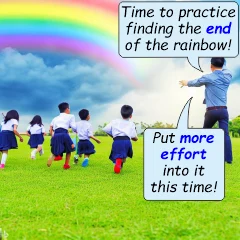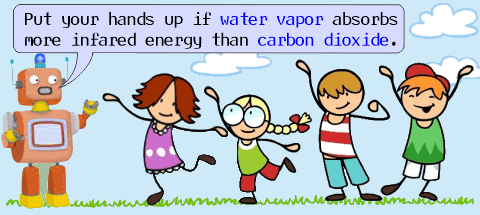Our childhoods should not be wasted
Our childhood is a small
portion of our life, but it is the most critical portion of our life
because it is the only time that our brain can rapidly learn information and skills,
and it is when our body is adapting
to the environment, and developing
its muscles, bones, and immune system. However, all cultures are wasting a large
portion of childhood because they are still following
animal culture. Four examples are:
| 1) |
|
Learning absurd
languages or vocabularies
The children who must learn Chinese, Japanese, and other crude
languages are
wasting a significant portion of their childhood.
The children in Europe and the US are wasting a portion of their
childhood by learning of foreign
languages, and by learning
unnecessarily large
vocabularies.
If the world would switch to English, and stop promoting large
vocabularies, the children would not have to waste any of their time on
primitive languages, or foreign languages. They would have more time to
learn something useful.
Our memory is limited, so filling a child's memory with unnecessary
words and complex languages is as idiotic
as cluttering a house with
unnecessary toys, clothing, and furniture. |
|
|
|
2)
|
|
Encouraging worthless
fantasies
All cultures are encouraging children to spend a lot of their
leisure time on fantasies, such as fictional books, television
programs,
Hollywood movies, and video games.
A lot of people criticize children for spending a lot of time with cell
phones, video games, social media, and Internet videos, and they
encourage the children to read books, but
they encourage children to read fiction books,
but there is no evidence that reading a Harry Potter book is more beneficial than
watching a Harry Potter movie.
It is possible for fictional
material to be beneficial, as mentioned here,
but
almost all of the fictional materials produced in a free enterprise
system are entertainment without
benefit.
The children who spend their time with worthless fiction are
filling their mind with unrealistic fantasies, which can encourage
idiotic and unrealistic attitudes and goals. However, no culture yet
cares about the quality of the information that they are giving to
their children. Every culture is still practicing the animal attitude
of "enjoying"
children rather than preparing them for life. |
|
|
|
3)
|
|
Practicing worthless activities
Schools are encouraging children to practice
soccer, basketball, and
other activities in order to win
competitive recreational events. However, children do not benefit
by winning those events, and they do not suffer by
losing, so they are wasting their
childhood by practicing those events. They are developing a skill that has no
value.
Children need exercise, but the activities in a democracy tend to be emotionally attractive, rather than
designed to provide the most beneficial exercise, and some of the
activities cause serious physical injuries and brain damage. |
|
|
|
4)
|
|
Memorizing useless
information
Every school system is still based on the original system from 6000
years ago, which was created to teach children to do arithmetic and to
read and write. The schools are doing an excellent job of those
two tasks, but they have since expanded into providing lots of other
courses with no concern for whether that additional education has
any benefit. This is resulting in children learning a lot of
information they have no use for.
Children have a phenomenal ability to learn information, so it is absurd to
waste that talent on the memorization of worthless
information.
To make the situation more absurd, there is no concern whether the
information that schools teach is honest, and
this allows crime networks, Jews, religious fanatics, feminists, and
other people to provide children with false information about the world
wars, human behavior, climate change, the 9/11 attack, and the Apollo
moon landing.
The end result is that many children become adults who forgot a
lot of what they learned as children, and many
adults discover that they need to learn some additional, and useful, information in order to get
a job. |
The Schools Minister is
required to experiment with the school curriculum and recreational
activities to figure out what provides the children with the best
preparation for life. These experiments will never end because the
curriculum will need routine changes in order to adapt to the endless
changes in technology and culture.
Children do not benefit from history
Children don't have much of
an interest in
history, or a use for it, so the Schools Ministry is required to
provide
historical information only to the older teenagers. If a
child wants to learn some history during his leisure time, that is
acceptable, but schools cannot include history as part of the
curriculum for the preteen children.
Children do not benefit from winning sports
The School and Children
Ministries are responsible for designing
activities for the children, but they cannot give the children the
activities that the children want.
They must design activities that
will be beneficial to the
children and to society.
Most of the existing recreational activities for children are
detrimental because they encourage the children to win the
activity. Encouraging the children to win competitions is detrimental
because it encourages the arrogance of the winners, and it can cause
the losers to suffer from low self-esteem, or becoming envious, angry,
or sad.
 It is especially detrimental to encourage children to practice
recreational activities because that causes them to waste a portion of
their short and precious childhood on the development of a skill that has no value. It is as stupid as encouraging children to
practice finding
the end of a rainbow.
The adults who are involved with training the children are also wasting
a portion of their life.
Encouraging children to win leisure activities is also encouraging them
to set goals for themselves with no concern for whether the goal has a
benefit to them or society. The Schools Minister is required to teach
children
to analyze their activities and goals, and ensure that they are doing
something that is beneficial to themselves and other people.
Teaching children to practice recreational activities is likely to
cause them to become adults who believe that they must train for and
win
the
casual
games of tennis, golf, and chess that they play with their friends, and
it can encourage adults to waste time and money trying to find "better"
golf clubs,
baseball bats, and soccer shoes.
The Schools and Children Ministries must design activities for children
that
encourage beneficial attitudes and behavior, and which provide useful
exercise. Most of the existing leisure activities for children
do not provide useful
exercise. Some sports, such as baseball, don't provide much exercise,
and others, such as rugby and tackle football, encourage brain
and nerve injuries that the ministers must
regard as unacceptable.
The ministers must create beneficial
activities
As with other government
officials, the Schools and Children Ministers cannot pander to the
children or
their parents. They are responsible for experimenting with activities
in order to find ways to make them more beneficial for the children.
They must prohibit or alter the activities that
encourage bad attitudes or behavior.
Developing beneficial
activities for children will take time and experiments, and
during the first few years the experiments will likely seem crude.
However, the experiments will help us gain knowledge, and
eventually we will figure out how to provide children with activities
and educational programs that they benefit from.
Robots can assist in raising
children
Prehistoric children would
learn everything they needed to know simply by observing the adults,
but today children need to learn so much information, and much of it is
so complicated, that children must spend many years of their life in
school. Unfortunately, the human mind did not evolve to be a teacher,
so teaching children is somewhat irritating for us.
Parents want to play
with their children, and be entertained by their giggles and laughter.
Parents do not want to train
them for jobs or help them deal with laws, marriage,
disappointments, or other aspects of a modern society. Parents have an
especially difficult time teaching them about sex and human bodies.
To improve this situation, this constitution advocates the development
of robots to assist in the raising of children. As of 2024, we already
seem to have the technology to create robots that can provide some
games for children, such as "Simon Says". Children enjoy that type of
game, but adults quickly become tired of supervising it, so it would be
more sensible to let robots do it.
Furthermore, the robots can do more than give simplistic commands,
such as "Robot says put your
hands up". A robot could create
more
complex commands to help the children learn something. For example, a
robot could say "Put your hands
up if 2 plus 2 equals 7", or "Take a
step forward if hummingbirds eat insects".

Those type of commands can
help the children learn how to pay attention
to commands and follow them accurately, while also helping them learn
something useful. Robots would not get tired of supervising that game,
and
they can give commands about sexual issues without embarrassment.
Children's recreational areas
The Children Ministry
is responsible for experimenting with facilities that provide children
with recreational activities. This Ministry designs the children
facilities, and they post their requests in the Requests
category for the Economic Division to manufacture the facilities,
equipment, and supplies.
The Children Ministry must judge the facilities and activities
according to the benefits and disadvantages to society, rather than
according to what the children or parents want. The goal of
the Children Ministry is to provide the most beneficial activities, rather than
the most entertaining
activities.
Every activity is potentially dangerous, so we cannot create activities
that are completely safe. However, the Children Ministry must pass
judgment on when an activity is so dangerous that it needs to be
modified. For example, are the injuries from trampolines
acceptable? If not, should the Children Ministry prohibit
trampolines, or make them less bouncy, or require they have a boundary
fence and a thick, foam padding over the springs?

Whatever the Children
Ministry decides to do about trampolines and
other activities, they must post a document in the Explanations
category so that we can pass judgment on whether they are making wise
decisions.
Children need activities that are
more
intellectual
In a free enterprise
system, the businesses prefer to create products for the largest number
of consumers, and that results in businesses pandering to the "typical"
parents and children. This provides the "ordinary" people with a wide
variety of the toys, foods, television programs, and activities that
they want, but the children who are unusually curious, adventurous, or
intelligent do not have so many options.
The Children Ministry will improve upon that situation by ignoring
what the parents and children want, and designing activities and
facilities according to what will be most beneficial to the children.
This will allow the Children Ministry to provide activities that
encourage curiosity, intelligence, and thinking.
For example, they will be able to justify the development of equipment
and software to let children stand in front of a camera to
analyze their body. That technology exists today, but it is very crude,
as can be seen in the photos below.
 |
|
 |
|
A girl looks
at a simulation
of her skeleton as she moves.
|
|
A boy
looks at a simulated window on his body to see his skeleton.
|
The children could also be given access to equipment that gives them an
infrared image of their bodies so that they can see which sections
produce the most heat, and whether there are any areas that might be
suffering from a medical disorder.
Robots will also eventually
be able to help children learn how to take their heartbeat and blood
pressure, look inside their ear with tiny cameras, and analyze their
pee for sugar and other chemicals.
As our societies become more technically advanced, people need to have
a greater interest in ability to understand and use technology. The
children's toys should adapt by becoming more similar to the equipment
that they will use when they are adults.
Children in 2024 can play with magnifying glasses, electric scooters,
telescopes, microscopes, cell phones, computers, and pocket calculators
that are more advanced than the equipment that the adults had a
thousand years ago.
The children thousands of years in the future will play with toys
version of CT scanners, electron microscopes, DNA sequencers, and 3D
printers that are more advanced than the the equipment in scientific
labs today.
The Security Ministry must eliminate crime
In order to truly improve
children's lives and their recreational activities, we must be
intolerant of the criminals who are involved with human trafficking,
illegal organ sales, pedophilia, and murdering children for their blood
for either Jewish rituals or for trying to remain young.
Every culture today is more concerned with feeling sorry for criminals
and trying to rehabilitate them than in protecting children. This
results in a culture that puts a lot of labor and resources into jails
and rehabilitation programs, and which teaches children to be afraid of
strangers and remain inside their home at
night.
This Constitution reverses that attitude. There is no pity for
criminals, and the dangerous criminals are evicted. This Constitution
requires the Quality Division to keep crime at such a low level that
children can go outside to play, even at night. The land between the
neighborhoods should be a recreational area for children and
adults. Crime should be so low that children feel
safe to sleep in the parks with
their friends. Parents should not have
to fear that their children will be kidnapped, murdered, drained of
their blood, or raped.
When children look out of the window of their apartment, they should
see
a giant playground between
the neighborhoods.

There should not be any
homeless people living in the bushes, and there
should not be any people vandalizing
the city by breaking glass bottles on the bicycle paths or spraying
graffiti on the buildings.
There is no pity for defective children
Humans inherited the
intense craving of animals to care for and protect their children, and
a democracy allows people to satisfy this craving to extremes. For
example, many parents have demanded that public swimming pools be
off-limits to children unless there is an adult present to provide
lifeguard services.
It is sensible for adults to prevent infants
from having access to
swimming pools, knives, and medicines, but we must raise standards for
everybody, and that includes children. Children are the next generation
of adults, not fragile toys. The ministers are required to design
culture to fit the people, including the children, that we regard as desirable, not the
people who are the worst behaved, most neurotic,
most incompetent, and most stupid.
The prehistoric children played in water, climbed trees, and chased one
another around the campsite. Some of those children became injured or
died by falling out of trees, getting poked in the eye by branches,
tripping over rocks, drowning, and choking on food.
Injuries in that era could be deadly since there was no medical
technology.
The prehistoric children who
survived were more aware of the need to protect their eyes, avoid
inhaling water, be cautious when climbing trees, and be more aware of
the rocks, thorns, and pits on the ground.
When a child drowns in a swimming pool, no culture considers the
possibility that the child is genetically inferior to those who are
capable of swimming without drowning. Likewise, when a child chokes on
food, no culture considers the possibility that the child has
something genetically inferior about him compared to the children who
can eat without choking.
This constitution has a different attitude. Specifically, that a
certain percentage of the children will be
inferior to the others, and we must not design
culture to fit the
inferior children. We must accept the unpleasant aspect of life that
half of the children are below-average, and a small percentage are extremely
inferior.
The recreational activities for children must be designed according to
the abilities and limitations of the children that we regard as desirable. For example, the
recreational areas
for children should not
enclose a swimming pool in ugly chain link fence, or provide
lifeguards, because a normal child will not drown. A
modern child who cannot swim is considered to be too defective for this modern era.

The swimming pools should
be beautiful decorations in the
city, and the children should have easy access to them. Some of the
swimming pools will be restricted to adults, but the recreational pools
for children cannot have chain link fences, lifeguards, or other safety
procedures.
The only safety
feature that the children need is the same that the
adults benefit from; namely, lights in
and/or around the water so that
they can safely swim at night.
The children who are too
defective to take care of themselves, or
properly use the recreational equipment, should be restricted from
those activities,
or restricted to certain neighborhoods, or, if they are young enough,
euthanized. We should not make the high-quality children suffer, or
make our city ugly, simply
because a tiny percentage of the population is too defective to cope
with modern life.
Children do not have secrecy
Most or all cultures today
provide children with more secrecy than the adults have. For example,
when children commit crimes, they are usually not identified, and when
they become adults, they are allowed to request the police to hide
their criminal behavior.
This constitution regards children as young
adults, so their behavior is considered to be an indication of
their genetic characteristics. Therefore, their behavior is regarded as
valuable information
for scientists and doctors who are trying to understand human behavior
and health, and it can help the Reproduction Ministry determine who
should reproduce.
We must expect idiotic and
crude behavior from young children, but we must set standards for
children. The children that cause trouble at social or recreational
activities, museums, or tours of a business, factory, or social club must be restricted from those
activities rather than allowed to torment the adults or encourage bad
attitudes in other children.
The Children and Behavior Ministries have the option of clearing those
restrictions when a child becomes a teenager, if they believe the child
has shown the potential to improve his behavior. Their history cannot be
erased,
however, so whatever bad behavior they showed as a child will remain in
their database entry. If the badly behaved children don't improve
during their teenage years, then they are regarded as inferior adults.
They are given only that one chance to improve.
|
